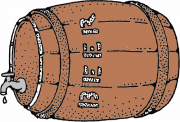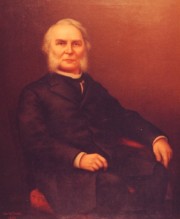Maine was the home of prohibition. In 1846 Maine passed the first laws in the country outlawing the sale of alcoholic beverages except for “industrial and medicinal purposes.”
In 1851, a stricter statute known as the “Maine Law” was passed and signed by the “Father of Prohibition,” Governor John Hubbard. It prohibited both the manufacture and sale of alcoholic beverages. The “Maine Law” was repealed in 1858 and was replaced by one that allowed the limited sale of alcohol as a beverage. Throughout this period enforcement was a problem and bootlegging was commonplace.
The State’s regulation of liquor began in 1862 with the establishment of a “Commission to Regulate Sale of Intoxicating Liquors” to have control of liquors kept and sold for medicinal and manufacturing purposes.
During the 19th century, concerns about the effects of alcohol spawned the formation of local advocacy groups, such as the Sabattus Temperance Union, which was organized on October 25, 1877; the Sebec Woman’s Christian Temperance Union, organized on July 23, 1894; and the Woman’s Christian Temperance Union in Winterport, organized on April 29, 1897.
Liquor laws were again tightened in 1871 when the sale of wine and cider was prohibited. In 1883, an amendment to the state constitution was adopted which outlawed the sale or manufacture of alcoholic beverages, but cider was omitted.
Leading the fight for both Maine and national prohibition was the author of the “Maine Law,” Neal Dow. Dow, a Portland native, became known as the father of American prohibition and was the Prohibition Party’s candidate for president in 1880.
The 1890s saw the Women’s Christian Temperance Union rise to power and take up the fight for national prohibition under the leadership of Lillian M. N. Stevens of Dover, Maine.
In 1905, a Liquor Enforcement Commission was established, though abolished in 1911. In that year the Democratic controlled legislature passed a proposed constitutional amendment “To abrogate the 26th Amendment [of 1883] relating to the manufacturing and sale of intoxicating liquor.” It was defeated by the narrow margin of 60,095 votes Yes and 60,853 votes No.
As with the rest of the nation, enforcement of prohibition was never entirely successful. Until national prohibition was passed in 1919, many hotels, restaurants and other drinking establishments operated under what became known as the “Bangor Plan.” Under this plan, the owners of places which served alcohol would go to court and pay a set fine twice a year, and the police basically looked the other way the rest of the year.
Maine’s prohibition laws were repealed in 1934, one year after the end of national prohibition. However, the State Liquor Commission, renamed that year from the State Liquor Licensing Board created the previous year, continued in effect.
There are still some towns in Maine that prohibit the sale of alcohol within their boundaries. Others allow off-premises consumption only.
Alcohol sales in Maine are controlled by the State Liquor and Lottery Commission, which operates State liquor stores and licenses agency stores to operate in areas not served by the state-run outlets.
Additional resources
Appleton, Daniel Fuller, 1826-1904. The Origin of the Maine Law and of Prohibitory Legislation, with a brief memoir of James Appleton. New York. The National Temperance Society and Publication House. 1886.
Blocker, Jack S., et al. Alcohol and Temperance in Modern History: A Global Encyclopedia. Santa Barbara, CA. ABC-CLIO, Inc. 2003
Day, Holman, 1865-1935. Does Prohibition Pay?: Maine, after fifty-seven years of prohibition. New York. D. Appleton. 1908.
Documentary History of the Maine Law: comprising the original Maine law, the New York prohibitory law, legislative debates, arguments, judicial decisions, statistics, important correspondence; “inquisition” and anti-prohibition. New York. Hall and Brother. 1855.
Dow, Neal, 1804-1897. A History of Prohibition in Maine. 1893.
Gordon, Ernest Barron. The Maine Law. New York, Chicago [etc.] Fleming H. Revell company. c1919.
Wing, Henry A. Maine’s War upon the Liquor Traffic, a series of historical articles published in the Portland Evening Express. Portland, Me. Portland Evening Express. 1909?



